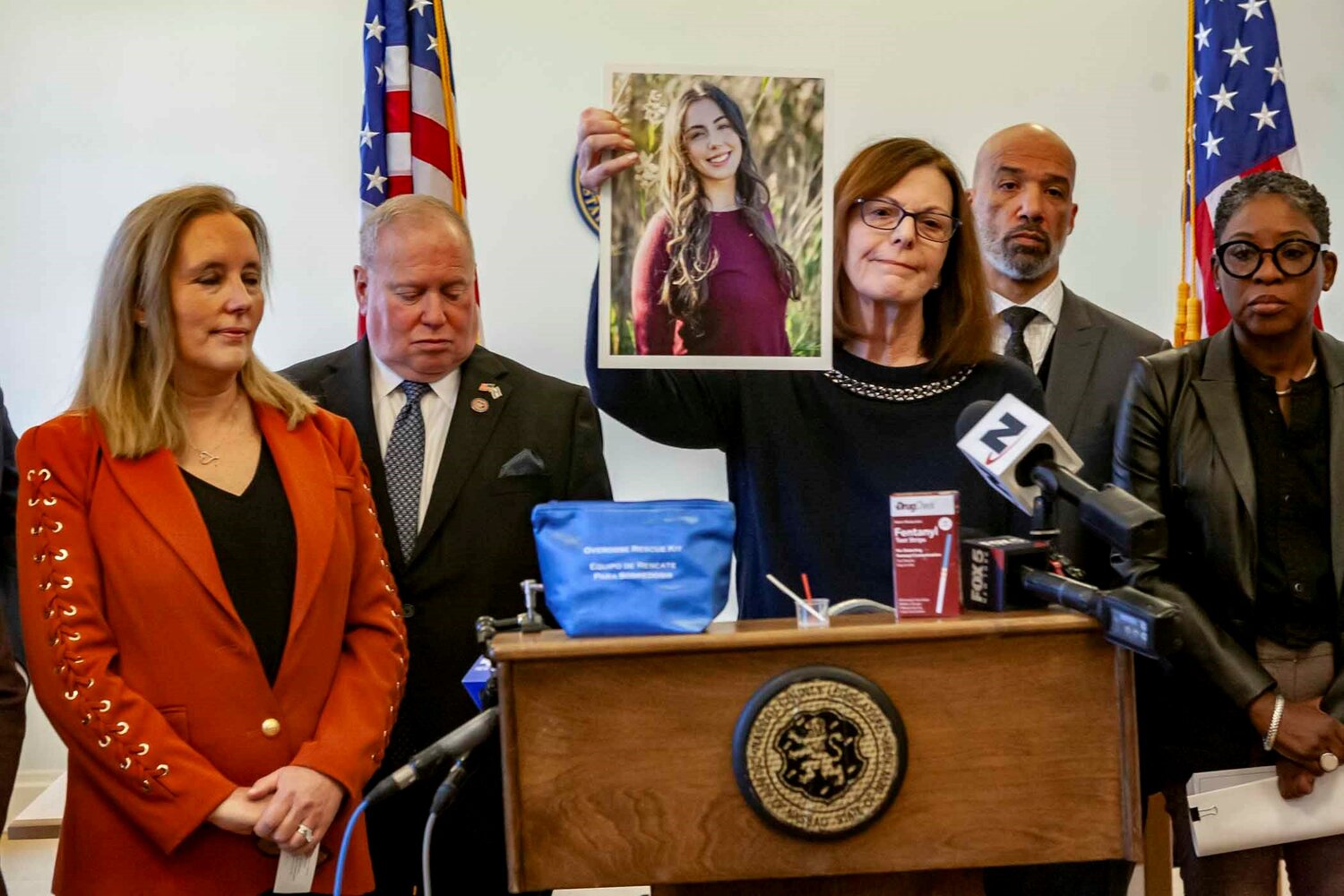Call for fentanyl strips intensifies amid opioid crisis
Paige Gibbons had a sleepover with two friends in 2022. Gibbons, of Glen Cove, and one of the other girls bought what they thought was Percocet from an illicit dealer, hoping to ease some of their stress. They were unaware that it was laced with fentanyl.
Four days after taking a small nibble of a pill, Gibbons died. Her friend, who ingested a smaller amount, suffered two strokes, but survived, spending weeks in a hospital’s critical-care unit.
Cornnie Kaufman, Gibbons’ grandmother, told the 19-year-old’s story at a news conference on Monday in Mineola, just before a bill called the Families Against Fentanyl Act was filed in the Nassau County Legislature. It would include fentanyl test strips in kits now being distributed throughout the county to prevent opioid drug overdoses.
“At 19 years of age, she had a brilliant future ahead of her,” Kaufman said of Gibbons. “Her community-service projects were about life, such as driving an ambulance, teaching CPR to her classmates, and choosing to be a doctor. Although those dreams have been lost, the message of her death isn’t.”
Kaufman has shared the story of her granddaughter’s sudden death many times in the 15 months since it happened, in the hope that it will serve as a warning to prevent other families from experiencing the same grief.
Fentanyl is a strong synthetic opioid that has been used in clinical settings for decades. It is often described as 80 to 100 times stronger than morphine, and 50 times stronger than heroin. One kilogram of fentanyl has the potential to kill 500,000 people.
There are two types of fentanyl, the pharmaceutical variety and the illicitly manufactured version. Pharmaceutical fentanyl is prescribed by doctors to treat severe pain, especially after surgery and for advanced-stage cancer. Most fentanyl-related overdoses, however, are linked to the illicitly manufactured version, which is distributed in illegal drug markets and sought for its heroin-like effect. It is often added to other drugs because of its extreme potency, which makes them more powerful, more addictive and more dangerous.
“Just one time is all it takes for someone to succumb to fentanyl,” Legislator Delia DeRiggi-Whitton said during the conference. “With these test strips, people can check the drug for fentanyl, and at least 10 other drugs which are similar to fentanyl. These strips are not the silver bullet, but it’s our only tool that we have, and it’s something that we know can work. Every day that we wait, it should be on the county executive’s conscience.”
Fentanyl strips are small pieces of chemically treated paper that detect the presence of the opioid within minutes if it has been added to other drugs. The Families Against Fentanyl Act would add the strips to kits with Narcan, an opioid antidote that reverses an overdose, that are made available to the public by a variety of agencies.
The Legislature’s Democratic minority caucus has repeatedly urged Republican County Executive Bruce Blakeman’s administration to make more of the county’s portion of the state’s 2022 settlement with opioid manufacturers and distributors available for such measures. Democrats accuse the county of spending less than $202,000 of more than $92 million the county has received to date on opoid overdose prevention and treatment.
“No community has been spared from the scourge of the opioid crisis, and the $92.5 million that Nassau County has received could make a tremendous impact upon the lives of those who are in the grips of addiction,” DeRiggi-Whitton said at the conference. “Considering the wave of devastation that we have experienced and the promises that have been made, it is infuriating to know that, two years later, just a sliver of these funds have actually been spent on life-saving initiatives. Where is the urgency as opioids continue to devastate our families?”
In a statement, Blakeman said that his administration is “always trying to make a safer environment for our kids,” and “one death is one too many.” He said he was open to partnering with a free, state-run program to make the strips more accessible.
Asked about the pace of the distribution of opioid settlement funding, Blakeman said that the county “will continue to fund worthwhile projects that will provide immediate results rather than waste precious funds on projects and programs that are not proven.”
Asked for clarification about projects and programs that are “not proven,” Blakeman’s office had not responded as the Herald went to press.

 43.0°,
Partly Cloudy
43.0°,
Partly Cloudy 





